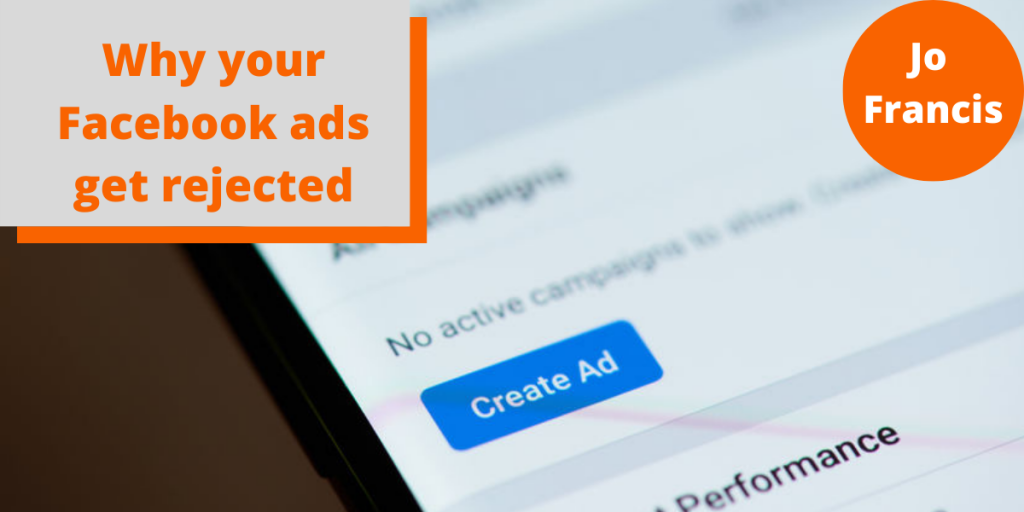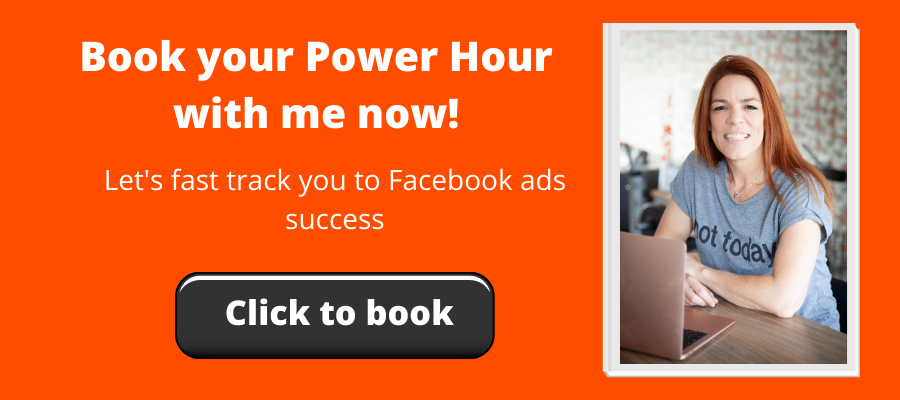
Why your Facebook ads get rejected
You’ve taken your time, you’ve crafted what you believe to be the perfect copy for your Facebook ad, you’ve sourced or created fantastic images, you’ve built out the campaign and hit publish…the ads head into review…then suddenly you’re hit with a notification telling you that your ad has been rejected!
Wait! What?!?
This has to be a mistake right?
You hit “request a review” without even giving a thought to what Facebook has to say about why they’ve rejected your advert – because you KNOW it’s brilliant.
The ad gets reviewed. And rejected. AGAIN.
What is going on at Facebook HQ? Do they hate you?
Probably not. (I can’t say for definite).
There are MANY reasons that ads get rejected, and it can feel really frustrating. The review process doesn’t appear to be human, so without making any changes, very often your ads will be repeatedly rejected.

Why Facebook ads get rejected
Here’s a few things to look out for when you’re creating your ads, that can often end up in them being rejected:-
1. What you are trying to advertise is prohibited
2. What you are trying to advertising is restricted
3. Something in your ad copy indicates you’re not following community standards
4. There’s an error with your ad creative
5. There’s something not right with your landing page
1. What you are trying to advertise is prohibited
This one is pretty simple. It doesn’t take a rocket scientist to work out what Facebook is and isn’t going to let you advertise.
But, just in case, here’s the breakdown:-
- Weapons, ammunition, explosives
- Unsafe supplements (no dodgy weightloss pills etc)
- Pharmaceuticals (prescription drugs)
- Illegal drugs or drug-related products (less prescription, more party)
- “Adult” products and services (contraception and family planning IS allowed, but anything else related to sex will be a no go)
- Cryptocurrency (nobody really knows what it is anyway!!)
- Payday loans
- Surveillance equipment
- Penny auctions
- Tobacco or tobacco-related products
- Counterfeit documents
- Spyware or malware
- Anything illegal (yep, that kinda makes sense!)
Now there’s also three more, that I want to be a little more specific with.
- Multilevel marketing schemes
I have had two different sets of client ads rejected just this week, as they were flagged as MLM schemes. I hasten to add that neither were, however both were focussed on “increasing monthly income” and “generating additional income”. Despite numerous review requests, these ads did not get through until the wording was completely changed.
If an ad is seen to be offering people ways to “get rich quick” or comes across as any kind of pyramid scheme, it will be rejected.
- Sensational Content
This one is fairly easy to understand. Nothing too shocking, gory, scary or depicting violence. You also need to be aware on this that it does apply to images as well, so don’t go all out with your shock tactics.
- Non-existent functionality
I flag this one as it’s another one I also got recently caught out by. You can’t have anything on your images that replicates the features of a play button or a checkbox that does not work on your ads.
I created an Instagram story ad for a client in Canva, with an arrow that, when used on the ad, would point to the SIGN UP button. Facebook did NOT like that and repeatedly rejected the ads. Removed the arrow, and the ads passed.
To me, the issue didn’t fall into the non-existent functionality category, but who am I to argue. (I mean, I did… but no-one listened!).
2. What you are trying to advertising is restricted
These are the things that technically are allowed to be advertised – but not BY everyone or TO everyone. Say what?
So, things like:
- Alcohol – it can be advertised but your targeting age must be right for the country you’re advertising in and alcohol must be legal in the country you’re advertising in.
- Dating – Ads for online dating services are only allowed with prior written permission. Targeting can only be to single or unspecified relationship status audiences, content cannot be “saucy”, pictures cannot be pixelated or blurred and mail-order brides are a definite no no!
- Online Gaming & Gambling – again, prior written permission is needed, unless it’s a physical casino or the state/government lottery.
- Online Pharmacies – Ads must not promote the sale of prescription pharmaceuticals. Ads for online and offline pharmacies are only permitted with prior written permission.
- Promotion of Over-The-Counter Drugs – Ads that promote over-the-counter medicines must comply with all applicable local laws, required or established industry codes, guidelines, licenses and approvals, and include age and country targeting criteria consistent with applicable local laws.
- Subscription Services – if you’\re offering anything that requires someone to pay by recurring subscription then there’s quite a detailed list of requirements given by Facebook, which you can take a look at here.
- Financial and Insurance Products and Services – as you can imagine, the key with these type of services is to be upfront, honest and totally not disingenuous. Ads must clearly provide full information on associated fees, including APR percentages, transaction fees, interest rates and the physical address of the entity offering the product within the ad’s landing page. And the audience targeting has to be to over 18s only.
- Branded content – is this the death of the influencer? No, not at all! Facebook does allow branded content posts, so if you’re working with a brand partner or an influencer you have to tag the sponsor. Full details here.
- Ads About Social Issues, Elections or Politics – as you can imagine, social media sites are hot on this type of advertising right now. There’s a whole stack of details about it that you can check out in depth on Facebook here.
- Cryptocurrency Products and Services – Ads may not promote cryptocurrency trading or related products and services without prior written permission.
- Drug and Alcohol Addiction Treatment – Facebook requires advertisers who wish to run addiction treatment ads targeting the USA to be certified with LegitScript, and apply to Facebook for permission to advertise.
- Cosmetic Procedures and Weight Loss – Ads marketing weight loss products and services or cosmetic surgeries and procedures must be targeted to people at least 18 years or older.
3. Something in your ad copy indicates you’re not following community standards
What does that even mean?
Facebook have developed a set of Community Standards that outline what is and is not allowed on Facebook. You can check it out in detail here.
The key points are:
- Authenticity: They don’t want people using Facebook to misrepresent who they are or what they’re doing.
- Safety: Expression that threatens people has the potential to intimidate, exclude or silence others and isn’t allowed on Facebook.
- Privacy: Facebook are committed to protecting personal privacy and information.
- Dignity: Facebook expect that people will respect the dignity of others and not harass or degrade others.
So far so good, all sounds simple and understandable. But something is still going wrong with your ads, even though you’re pretty damn sure that there’s nothing illegal, harmful or even vaguely restricted, and you’re pretty sure you’re following the community guidelines.
So then it’s time to look and see if…
4. There’s an error with your ad creative
It could be as simple as there’s too much text on your image. Whilst this doesn’t always mean that ads get rejected now (it certainly used to…), it does mean that Facebook will reduce the reach of your ad based on how much of your image is covered in text.
Here are Facebook’s new tiers of image text acceptability:
- Image text: OK – Your ad will run normally.
- Image text: Low – Your ad’s reach may be slightly lower.
- Image text: Medium – Your ad’s reach may be much lower.
- Image text: High – Your ad may not run.
However, if everything’s a-okay with your image, then it’s MUCH more likely to be that your text is targeting personal attributes. And this is one that trips up ads A LOT of the time, and even when you’re well seasoned at writing ad copy, you will still fall foul of this occasionally.
So what does it mean?
Personal attributes according to Facebook include “race, ethnic origin, religion, beliefs, age, sexual orientation or practices, gender identity, disability, medical condition (including physical or mental health), financial status, membership in a trade union, criminal record, or name,”.
What this means in truth is that you need to avoid using words like “you” and “yours” in your copy. You musn’t imply that you actually know anything about the users you’re targeting.
It sounds complicated, but it’s often just a case of rethinking your wording.
So, instead of “the perfect hair serum for women like you” you would have to go for “hair serum created for the modern woman”.
Another one to be cautious of is using Facebook’s brand. I’ve had ads rejected before that have mentioned (group challenges) that FB lives are included. You need to capitalize “Facebook” and write out the full name in your copy.
Another reason for ad rejection can be not being relevant.
It sounds obvious but your ads really do need to relate to the product or service you’re selling. And your ad creative needs to have some relevance to the audience you’re targeting.
You also need to ensure that you’re writing is up to scratch. Don’t make your ads look spammy – watch your spelling, grammar, punctuation, and capitalization. Don’t add extra punctuation marks – ?????!!!!!!….
So if you’re still convinced it’s none of the above, then could it be…
The landing page you link to is subject to the same policies as your Facebook ads.
The Ad URL has to match the landing page URL – no sending people off on some weird and wonderful journey elsewhere.
You must include your business’s address, phone number, email, and privacy policy on any landing pages. And if there are any legal notices or disclaimers specific to your industry that you’re obligated to include, make sure they’re on your landing page too.
There should be no false or misleading information on your landing page and it must be relevant to the product / service in the ad. No advertising a fitness programme and then taking people to a dodgy supplements page!
No spammy pop ups on your landing page, or auto-play videos, audio or automatic downloads. And no broken links or pages under construction.
And there has to be some visual or textual connection between the ad and the landing page it links to. This might mean using the same copy or headline from your ad copy somewhere on the page, or using the same color palette or images.
You just need to make sure that people will see your landing page and immediately know it’s related to your Facebook ad.
Hopefully this is a helpful overview of what could be causing your ads to be rejected. The best place to find out all the info and stay updated is, as ever, Facebook themselves. You can read their full ad policies here.
Need some more help with creating your ads?

